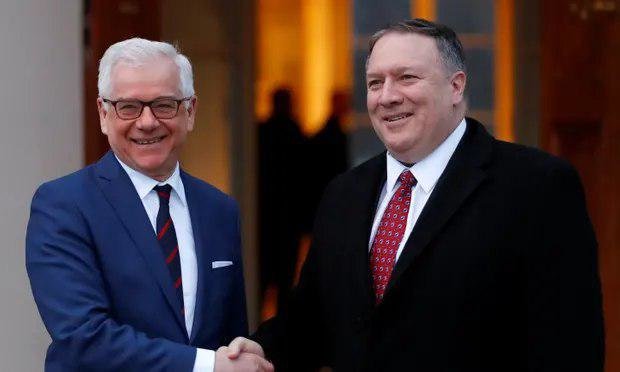European powers to present cool front at Warsaw summit

Key European powers will offer only limited participation in a high-profile Trump administration summit on the Middle East starting on Wednesday, reflecting their growing anger over unilateral U.S. policymaking on Iran and Syria.
The UK Foreign Secretary, Jeremy Hunt, will leave the Warsaw summit early, pleading Brexit Commons business, while France is sending a civil servant and Germany its junior foreign minister.
Federica Mogherini, the EU external affairs chief, will boycott the event, originally conceived by the U.S. as a way to press EU countries to adopt a more aggressive stance towards Iran.
The original summit agenda was scrapped after Europe told Washington it was “not a very smart idea” to hold a summit that would highlight Europe’s differences with the U.S. over Iran. The EU was not consulted before Mike Pompeo, the U.S. secretary of state, announced the summit, jointly hosted with Poland.
Despite retitling the agenda to focus on peace and security in the Middle East, European diplomats remain skeptical that figures such as Pompeo and the U.S. Vice-President, Mike Pence, will dial down their anti-Iran rhetoric at the summit.
The EU remains strongly supportive of the 2015 Iran nuclear deal that was abandoned by the U.S., even if it criticizes Iran’s ballistic missile program. It has finally devised a preliminary trading vehicle to resist U.S. secondary sanctions on firms that continue to trade with Iran.
The presence of leading anti-Iran Persian Gulf Arab states as well as Israel’s Benjamin Netanyahu in Warsaw will underline how hostility towards Iran can bring some Arab states and Israel together. One western diplomat said it would be the first meeting between Arab states and Israel since the 1991 Madrid peace conference.
Non-attendees include Qatar, Turkey, Lebanon, Iran and the Palestinian Authority.
The U.S. has signaled it will extend sanctions on Iranian oil exports in May. Brian Hook, the U.S. special representative on Iran, said last week: “We are not looking to grant any future waivers or exceptions to our sanctions regime, whether it’s oil or anything else,” adding that the U.S. aims to “get to zero imports” of Iranian crude as quickly as possible.
The Trump’s administration exempted eight counties from its sanctions, allowing them to continue importing crude from Iran for six months up to May.
British officials are privately skeptical about the rhetoric coming from Washington that it might impose sanctions on the proposed mechanism being set up by Europe to help trade, initially in unsanctioned goods such as food and medicines.
The Foreign Office permanent secretary, Sir Simon McDonald, would have to be one of those sanctioned by Washington since he is on the board of the new EU body.
(Source: The Guardian)
